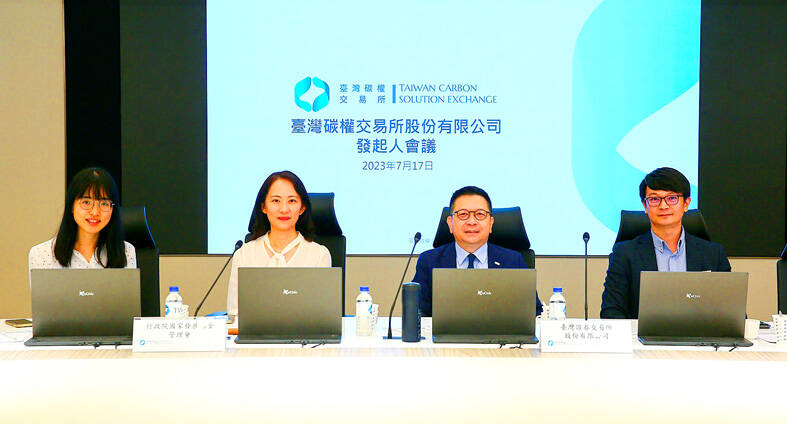Taiwan’s carbon exchange is to open today in Kaohsiung, as the nation aims to achieve net zero emissions by 2050, while addressing local firms’ need for carbon credit trading.
The Taiwan Stock Exchange and the National Development Fund jointly invested in the Taiwan Carbon Solution Exchange with NT$1.5 billion (US$47.33 million) of capital. It established its headquarters at the Kaohsiung Software Park (高雄軟體園區) and its information center in Taipei, after completing its company registration last month.
The Taiwan Stock Exchange has planned for the carbon exchange to include a carbon consultancy, and education and training, as well as to offer carbon credit trading.

Photo courtesy of the Taiwan Stock Exchange
To alleviate concerns among businesses, the exchange would initially focus mainly on consultation services for issues such as domestic carbon fees and levies, international carbon border taxes and supply chain carbon neutrality. It would also provide education and training services for businesses during this stage.
Carbon credit trading would come later, as such trading must meet regulations and policies stipulated by the Climate Change Response Act (氣候變遷因應法), and the Environmental Protection Administration (EPA) is still working out carbon pricing and trading rules.
Cross-border carbon trading would require further negotiations and collaboration with international accreditation institutions based on the needs of local businesses, the Taiwan Stock Exchange said.
Due to the net zero emission trend, companies seeking to secure orders are soon bound to include carbon emissions in their contract terms, as firms wanting to obtain orders from major global brands would have to comply with emission regulations.
The carbon exchange aims to help local businesses through carbon credit trading, the Taiwan Stock Exchange said.
For instance, if a company can reduce its carbon emissions, it would have excess carbon credits that can be sold to other companies with higher carbon emissions, while industries or companies with high carbon emissions can purchase carbon credits to offset their carbon footprints and achieve their carbon reduction goals, it said.
The Taipei-based Chinese National Association of Industry and Commerce yesterday welcomed the launch of the carbon exchange, saying in a statement that it is an important milestone along the nation’s road to achieving net zero emissions by 2050.
The association urged the government to establish the legal system for carbon credit trading as soon as possible, while implementing the trading mechanism in stages.
It said it also expects Taiwan’s carbon exchange to learn from its international peers to develop carbon pricing and trading systems that are sound and in line with international standards, so that domestic firms can plan carbon reduction paths in a timely manner and Taiwan’s industries can maintain their key position in the global supply chain.

ENDEAVOR MANTA: The ship is programmed to automatically return to its designated home port and would self-destruct if seized by another party The Endeavor Manta, Taiwan’s first military-specification uncrewed surface vehicle (USV) tailor-made to operate in the Taiwan Strait in a bid to bolster the nation’s asymmetric combat capabilities made its first appearance at Kaohsiung’s Singda Harbor yesterday. Taking inspiration from Ukraine’s navy, which is using USVs to force Russia’s Black Sea fleet to take shelter within its own ports, CSBC Taiwan (台灣國際造船) established a research and development unit on USVs last year, CSBC chairman Huang Cheng-hung (黃正弘) said. With the exception of the satellite guidance system and the outboard motors — which were purchased from foreign companies that were not affiliated with Chinese-funded

PERMIT REVOKED: The influencer at a news conference said the National Immigration Agency was infringing on human rights and persecuting Chinese spouses Chinese influencer “Yaya in Taiwan” (亞亞在台灣) yesterday evening voluntarily left Taiwan, despite saying yesterday morning that she had “no intention” of leaving after her residence permit was revoked over her comments on Taiwan being “unified” with China by military force. The Ministry of the Interior yesterday had said that it could forcibly deport the influencer at midnight, but was considering taking a more flexible approach and beginning procedures this morning. The influencer, whose given name is Liu Zhenya (劉振亞), departed on a 8:45pm flight from Taipei International Airport (Songshan airport) to Fuzhou, China. Liu held a news conference at the airport at 7pm,

Taiwan was ranked the fourth-safest country in the world with a score of 82.9, trailing only Andorra, the United Arab Emirates and Qatar in Numbeo’s Safety Index by Country report. Taiwan’s score improved by 0.1 points compared with last year’s mid-year report, which had Taiwan fourth with a score of 82.8. However, both scores were lower than in last year’s first review, when Taiwan scored 83.3, and are a long way from when Taiwan was named the second-safest country in the world in 2021, scoring 84.8. Taiwan ranked higher than Singapore in ninth with a score of 77.4 and Japan in 10th with

GRIDLOCK: The National Fire Agency’s Special Search and Rescue team is on standby to travel to the countries to help out with the rescue effort A powerful earthquake rocked Myanmar and neighboring Thailand yesterday, killing at least three people in Bangkok and burying dozens when a high-rise building under construction collapsed. Footage shared on social media from Myanmar’s second-largest city showed widespread destruction, raising fears that many were trapped under the rubble or killed. The magnitude 7.7 earthquake, with an epicenter near Mandalay in Myanmar, struck at midday and was followed by a strong magnitude 6.4 aftershock. The extent of death, injury and destruction — especially in Myanmar, which is embroiled in a civil war and where information is tightly controlled at the best of times —